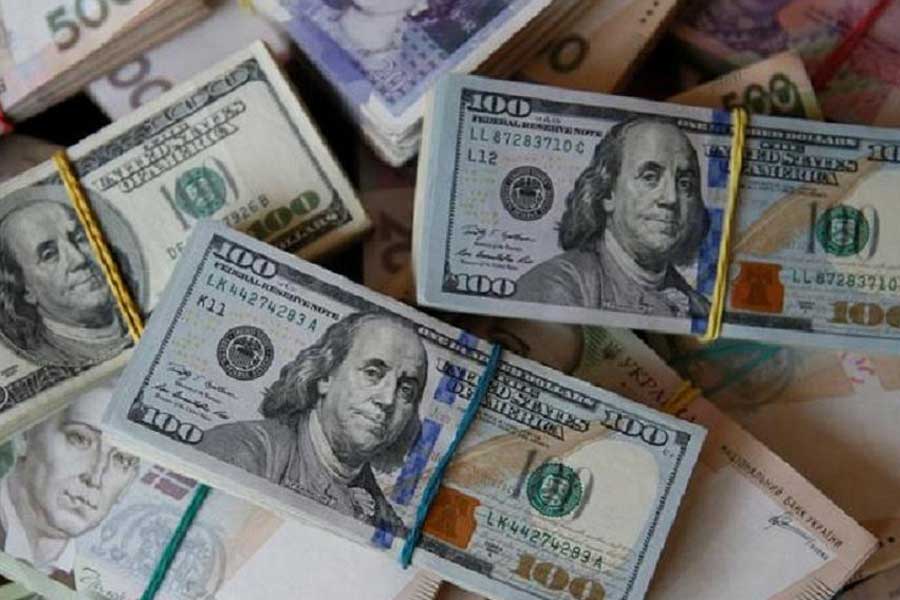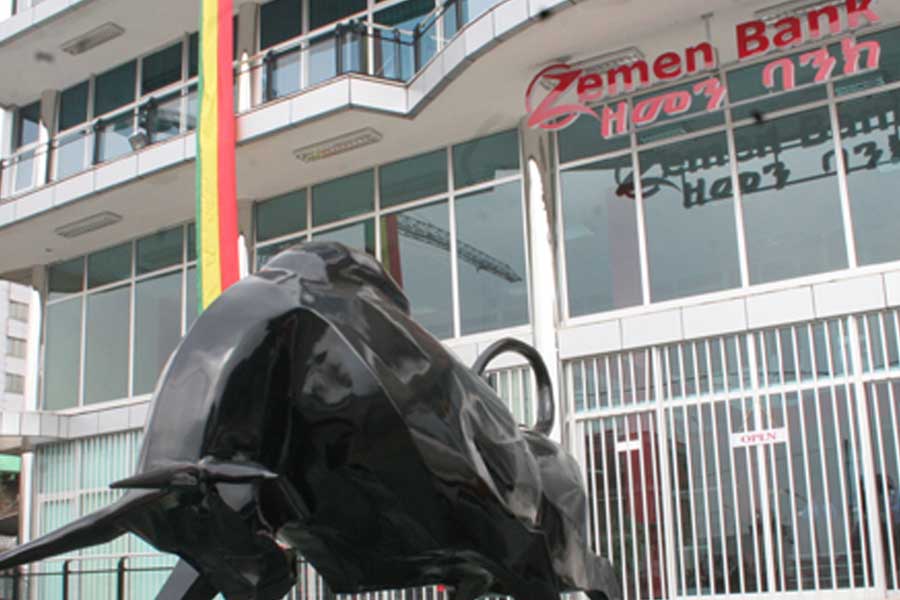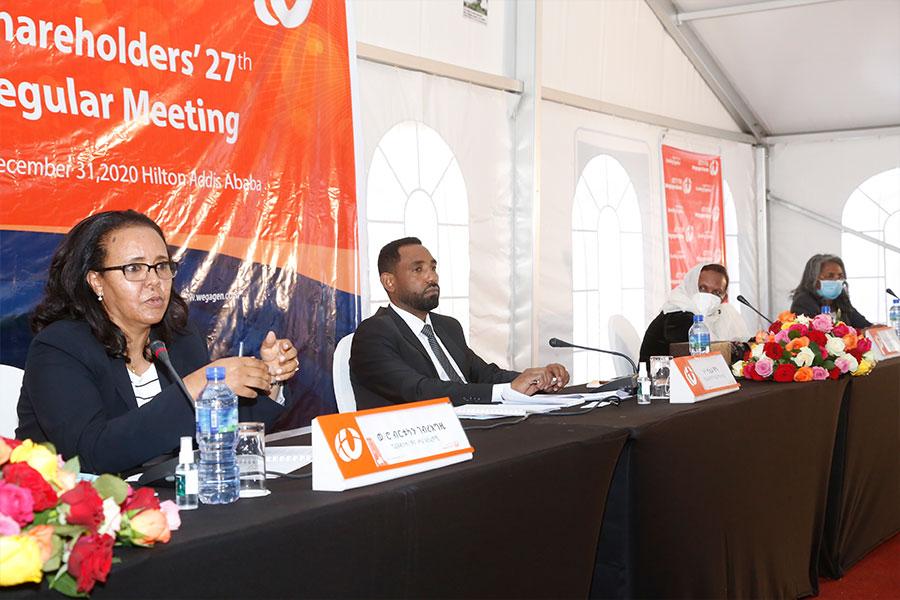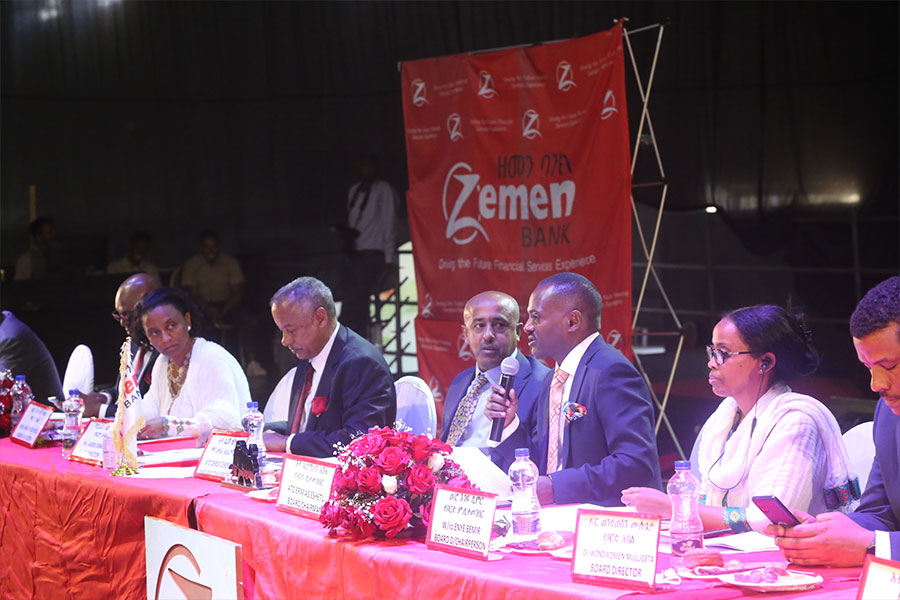
Fortune News | Jan 30,2021
Hibret Bank marked its silver jubilee with an impressive financial feat, posting an outstanding 111pc surge in net profits, reaching 2.3 billion Br, traversing economic adversities such as soaring inflation, political unrest, and shifting fiscal policies. The performance positioned Hibret Bank as a noteworthy contender in the intensely competitive banking terrain despite its relatively modest ranking compared to industry behemoths like Awash, Abyssinia and Dashen banks.
The surge in profitability was announced at the annual shareholders' meeting, held at the Sheraton Addis, where attendees revelled in the doubled profit earnings from the previous year, now standing at 50.72 Br per share. The Earnings Per Share (EPS) Hibret posted at 21.8pc may be respectable but overshadowed by the 32.2pc average for 15 private banks and the leading banks such as Awash Bank (57pc), Abyssinia (56.8pc) and Dashen (53.2pc).
Samrawit Getamesay, the board chairwoman, outlined the financial success achieved in a backdrop of high inflation rates, political unrest, dwindling foreign currency reserves, and the gradual lifting of fuel subsidies.
Despite its modest footprint compared to giants in the industry, Hibret Bank remained a significant player with a paid-up capital of nearly 4.7 billion Br, positioning it as a mid-tier financial institution. Its capital base is less than half of the industry's highly capitalised private bank (Awash).
Its total equity of 7.2 billion Br is very close to the 7.7 billion Br average for these banks, while its total assets amounting to 82.5 billion Br exceeds the 64.3 billion Br average, illustrating its modest yet competitive stance in the market. However, this is in sharp contrast to the larger banks such as Awash, which boasts equity of 20.9 billion Br, and assets size of 242.9 billion Br.
Hibret Bank's income was reported at a little over 10.3 billion Br, one-fifth of Awash Bank. It recorded a return on equity (ROE) of 14.7pc, lower than the industry average of 19.8pc and significantly trailing behind leaders such as Awash (25.8pc) and Abyssinia Bank (24.7pc). ROE is a crucial measure of a company's effectiveness in using its assets to generate profits, suggesting areas for improvement for Hibret. The Bank's return on assets (ROA) stood at 1.6pc, below the industry average of 2.4pc and well under second-generation banks such as Zemen and Addis International.
Hibret Bank's notable profit increase was attributed to a significant rise in interest income, reduced provisions for loan impairments, increased commission income, and lower administrative expenses, alongside a lower profit tax bill. Particularly impressive was Hibret's performance in financial intermediation. Interest on loans, advances, and investments in securities increased by 28.7pc to 8.6 billion Br. Provisions for loans and other asset impairments plummeted by 84.3pc to 103.1 million Br, markedly less than its peers.
Melaku Kebede, the Bank's president, attributed part of this success to the resurgence of businesses in the war-stricken Tigray Regional State, which has resumed positive earnings, aiding the reduction in provisions for loan impairments. Under Melaku's watch, the bank has shown prudent management in branch expansions, which were capped at 49 for the year, with 1,139 new staff recruited. The total branches reached 473, served by a total workforce of 8,839.
An alumnus of Addis Abeba University, Melaku has nearly two decades of experience in the banking industry and has been at the helm of Hibret for three years.
London-based financial statement analyst Abdulmenan Mohammed (PhD) lauded the Bank's management for these measures, noting the 15pc rise in commissions and service charges, which surged to 1.49 billion Br.
"The reduction significantly contributed to profit growth," Abdulmenan observed.
The Bank's approach to managing expenses was also noteworthy, as it maintained a balance despite promoting wage and benefits packages.
Samuel Ararso, a deputy manager at Hibret's Sidist Kilo branch, agreed that the relocation of major branches to the Bank's headquarters and its limited expansion might have contributed to the profit growth.
Liquidity issues, fueled by instability in parts of the country, were identified by Samuel as a primary concern for the industry. Staying with the Bank for a decade, he also stressed the Bank's focus on developing its technology assets, a sentiment echoed by the Bank's leadership.
"We're at the forefront of the digital era," he told Fortune, referring to an emerging demand from customers.
Dereje Taye, one of the 352 founding shareholders, expressed satisfaction with the Bank's overall performance and indicated an interest in increasing his stake to more than the two million Birr shares he owns in the Bank. He suggested that more time should be given when shares are floated, reflecting the shareholders' confidence in the Bank's future.
Shareholders' resolution to increase the paid-up capital by 11.3pc to 4.78 billion Br in the financial year remains 220 million Br short of the regulatory minimum threshold the central bank earmarked for 2026. The Bank's Capital Adequacy Ratio (CAR), at 12pc, was higher than the regulatory threshold, demonstrating the Bank's sound profit earnings. However, Abdulmenan recommended that shareholders further consolidate the Bank's paid-up capital as a precautionary measure, considering its incorporation with a modest 21.3 million Br, in the mid-1990s.
Despite the Bank's conservative approach to branch expansion, its interest expenses increased by 32.47pc to 3.06 billion Br, outpacing its growth in interest income. This increase is thought to be driven by a rise in the saving rate, as deposits grew by 20pc to 64.54 billion Br. However, the surge in wage expenses by 60.4pc to 2.71 billion Br was viewed as a concerning development by Abdulmenan, despite a decrease in general administration expenses.
The Bank's total assets also experienced a growth of 22.4pc, with its disbursed loans and advances growing by 31.4pc to 59.2 billion Br. However, Hibret's disbursement remains significantly behind that of its larger competitors such as Awash's 159.37 billion Br, Abyssinia's 143.8 billion Br and Dashen's 100.2 billion Br. Its loan-to-deposit ratio of 91.7pc was cautioned against further increases, as it might affect liquidity.
Melaku acknowledged the increase in the loan-to-deposit ratio and disclosed plans to reduce it to below 85pc, lower than the 87.6pc average for the 15 banks.
According to Melaku, the strategy aligns with the Bank's aspiration to balance growth with financial stability.
Hibret Bank's liquidity level has shown some decline. The total cash and bank balances dropped by 13.4pc to 9.23 billion Br, and the ratio of cash and bank balances to total assets lowered by 3.6 percentage points to 11.2pc. The liquidity decline was a concern for Abdulmenan, who urged the Bank to operate with sufficient liquidity.
"Hibret was operating with tight liquidity," said Abdulmenan.
Dereje, teh shareholder, urged executives to retain the momentum of keeping up with industry leaders. He suggested infusing younger talent into the management pool to bring new ideas and emerging trends.
"More effort is necessary to keep up with peer banks," he told Fortune. "Replacing some of the board members might be necessary."
PUBLISHED ON
Dec 23,2023 [ VOL
24 , NO
1234]

Fortune News | Jan 30,2021

Fortune News | Dec 26,2020

Fortune News | Oct 14,2023

Fortune News | Mar 06,2021

Fortune News | Dec 10,2022

Fortune News | Feb 04,2023

Fortune News | Jan 18,2020

Commentaries | Jun 17,2023

Radar | Aug 25,2024

Radar |

Dec 22 , 2024 . By TIZITA SHEWAFERAW
Charged with transforming colossal state-owned enterprises into modern and competitiv...

Aug 18 , 2024 . By AKSAH ITALO
Although predictable Yonas Zerihun's job in the ride-hailing service is not immune to...

Jul 28 , 2024 . By TIZITA SHEWAFERAW
Unhabitual, perhaps too many, Samuel Gebreyohannes, 38, used to occasionally enjoy a couple of beers at breakfast. However, he recently swit...

Jul 13 , 2024 . By AKSAH ITALO
Investors who rely on tractors, trucks, and field vehicles for commuting, transporting commodities, and f...

Oct 18 , 2025
The political establishment, notably the ruling party and its top brass, has become p...

Oct 11 , 2025
Ladislas Farago, a roving Associated Press (AP) correspondent, arrived in Ethiopia in...

Oct 4 , 2025
Eyob Tekalegn (PhD) had been in the Governor's chair for only weeks when, on Septembe...

Sep 27 , 2025
Four years into an experiment with “shock therapy” in education, the national moo...